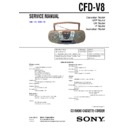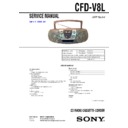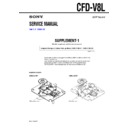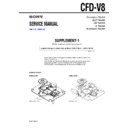Read Sony CFD-V8 Service Manual online
CFD-V8
SERVICE MANUAL
CD RADIO CASSETTE-CORDER
SPECIFICATIONS
Canadian Model
AEP Model
UK Model
E Model
Australian Model
Model Name Using
CD Section
CFD-V7
Similar Mechanism
Tape Section
CFD-V7
CD Mechanism Type (Former Type/New Type)
KSM-213RDP/KSM-213CDP
Optical Pick-up Type (Former Type/New Type)
KSS-213R/KSS-213C
Tape Transport Mechanism Type
MF-V5-117
– Continued on page 2 –
Ver. 1.6 2005.12
9-961-329-07
2005L02-1
© 2005.12
Sony Corporation
Personal Audio Division
Published by Sony Engineering Corporation
CD player section
System
System
Compact disc digital audio system
Laser diode properties
Material: GaAlAs
Wave length: 780 nm
Emission duration: Continuous
Laser output: Less than 44.6
Wave length: 780 nm
Emission duration: Continuous
Laser output: Less than 44.6
µW
(This output is the value measured at a distance of about 200
mm from the objective lens surface on the optical pick-up
block with 7 mm aperture.)
mm from the objective lens surface on the optical pick-up
block with 7 mm aperture.)
Spindle speed
200 r/min (rpm) to 500 r/min (rpm) (CLV)
Number of channels
2
Frequency response
20 - 20 000 Hz +1/–2 dB
Wow and flutter
Below measurable limit
Radio section
Frequency range
Frequency range
FM: 87.6 - 107.0 MHz or 87.6 - 108.0 MHz
AM: 531 - 1602 kHz or 530 - 1 710 kHz
AM: 531 - 1602 kHz or 530 - 1 710 kHz
Antenna
FM: Telescopic antenna
AM: Built-in ferrite bar antenna
AM: Built-in ferrite bar antenna
Cassette-corder section
Recording system
Recording system
4-track 2 channel stereo
Fast winding time
Approx. 120 s (sec.) with Sony cassette C-60
Frequency response
TYPE I (normal): 80 - 10 000 Hz
General
Speaker
Speaker
Full range: 10 cm dia., 3.2
Ω, cone type (2)
Outputs
Headphones jack (stereo minijack)
For 16 - 68
For 16 - 68
Ω impedance headphones
Power output
1.8 W + 1.8 W (at 3.2
Ω, 10 % harmonic distortion in AC
operation)
Power requirements
For CD radio cassette-corder: 120V AC, 60Hz (CND, TW)
220V AC, 60Hz (KR)
230V AC, 60Hz
230V AC, 60Hz
(AEP, UK, AUS, CET, IT, SP)
9 V DC, 6 size D (R20) batteries
Power consumption
AC 20 W
2
CFD-V8
SAFETY-RELATED COMPONENT WARNING!!
COMPONENTS IDENTIFIED BY MARK
0
OR DOTTED LINE WITH
MARK
0
ON THE SCHEMATIC DIAGRAMS AND IN THE PARTS
LIST ARE CRITICAL TO SAFE OPERATION.
REPLACE THESE COMPONENTS WITH SONY PARTS WHOSE
PART NUMBERS APPEAR AS SHOWN IN THIS MANUAL OR IN
SUPPLEMENTS PUBLISHED BY SONY.
REPLACE THESE COMPONENTS WITH SONY PARTS WHOSE
PART NUMBERS APPEAR AS SHOWN IN THIS MANUAL OR IN
SUPPLEMENTS PUBLISHED BY SONY.
TABLE OF CONTENTS
Specifications ............................................................................... 1
1. SERVICING NOTES
...................................................... 3
2. GENERAL
Location and Function of Controls ....................................... 4
3. DISASSEMBLY
3-1. Cabinet (Front) Sub ASSY, Cabinet (Rear) ................. 5
3-2. Control Board .............................................................. 5
3-3. Cabinet (upper) ............................................................ 6
3-4. Power Board, Inlet Board, BATT (R) Board,
BATT (L) Board ........................................................... 6
3-5. Volume Board, FM SW Board, Main Board ............... 7
3-6. PRE Board, Mechanism Deck,
Optical Pick-up Section, CD Board ............................. 7
3-7. Belt, M601 (Capstan / Reel Motor),
“HRP901 Head, Magnetic (Record/Playback)”,
HE901 Head (Erase) .................................................... 8
3-8. Optical Pick-up (KSS-213C) ....................................... 8
3-2. Control Board .............................................................. 5
3-3. Cabinet (upper) ............................................................ 6
3-4. Power Board, Inlet Board, BATT (R) Board,
BATT (L) Board ........................................................... 6
3-5. Volume Board, FM SW Board, Main Board ............... 7
3-6. PRE Board, Mechanism Deck,
Optical Pick-up Section, CD Board ............................. 7
3-7. Belt, M601 (Capstan / Reel Motor),
“HRP901 Head, Magnetic (Record/Playback)”,
HE901 Head (Erase) .................................................... 8
3-8. Optical Pick-up (KSS-213C) ....................................... 8
4. DIAL POINTER INSTALLATION
.............................. 9
5. ADJUSTMENTS
5-1. Mechanical Adjustments ............................................ 10
5-2. Electrical Adjustments ............................................... 10
5-2. Electrical Adjustments ............................................... 10
6. DIAGRAMS
6-1. IC Pin Function Descrintion ...................................... 13
6-2. Block Diagrams – Tuner/TC Section – ..................... 15
6-3. Block Diagrams – Main Section – ............................. 16
6-4. Block Diagrams – CD Section – ................................ 17
6-5. Printed Wiring Boards – Main Section – ................... 18
6-6. Schematic Diagrams – Main Section (1/3) – ............. 19
6-7. Schematic Diagrams – Main Section (2/3) – ............. 20
6-8. Schematic Diagrams – Main Section (3/3) – ............. 21
6-9. Printed Wiring Boards – Control/Power Section – ...... 22
6-10. Printed Wiring Boards – Control/Power Section – .... 23
6-11. Schematic Diagrams – CD Section – ......................... 24
6-12. Printed Wiring Boards – CD Section – ...................... 25
6-2. Block Diagrams – Tuner/TC Section – ..................... 15
6-3. Block Diagrams – Main Section – ............................. 16
6-4. Block Diagrams – CD Section – ................................ 17
6-5. Printed Wiring Boards – Main Section – ................... 18
6-6. Schematic Diagrams – Main Section (1/3) – ............. 19
6-7. Schematic Diagrams – Main Section (2/3) – ............. 20
6-8. Schematic Diagrams – Main Section (3/3) – ............. 21
6-9. Printed Wiring Boards – Control/Power Section – ...... 22
6-10. Printed Wiring Boards – Control/Power Section – .... 23
6-11. Schematic Diagrams – CD Section – ......................... 24
6-12. Printed Wiring Boards – CD Section – ...................... 25
7. EXPLODED VIEWS
7-1. Front Cabinet Section ................................................ 30
7-2. Rear Cabinet Section ................................................. 31
7-3. Upper Cabinet Section ............................................... 32
7-4. Mechanism Deck Section (1) .................................... 33
7-5. Mechanism Deck Section (2) .................................... 34
7-6. CD Block Section ...................................................... 35
7-2. Rear Cabinet Section ................................................. 31
7-3. Upper Cabinet Section ............................................... 32
7-4. Mechanism Deck Section (1) .................................... 33
7-5. Mechanism Deck Section (2) .................................... 34
7-6. CD Block Section ...................................................... 35
8. ELECTRICAL PARTS LIST
...................................... 36
This Compact Disc player is classified as a CLASS 1 LASER
product.
The CLASS 1 LASER PRODUCT label is located at the bottom
of the player.
product.
The CLASS 1 LASER PRODUCT label is located at the bottom
of the player.
Information
For customers in Europe
For customers in Europe
CAUTION
Use of controls or adjustments or performance
of procedures other than those specified herein
may result in hazardous radiation exposure.
of procedures other than those specified herein
may result in hazardous radiation exposure.
Battery life
For CD radio cassette-corder:
FM recording
Sony R20P: approx. 13.5 h
Sony alkaline LR20: approx. 20 h
Tape playback
Sony R20P: approx. 7.5 h
Sony alkaline LR20: approx. 15 h
CD playback
Sony R20P: approx. 2.5 h
Sony alkaline LR20: approx. 7 h
Dimensions
Approx. 420 x 165 x 256 mm (w/h/d)
(16
(16
5
⁄
8
x 6
1
⁄
2
x 10
1
⁄
8
inches) (incl. projecting parts)
Mass
Approx. 4.1 kg (9 lb. 1 oz) (incl. batteries)
Supplied accessory
AC power cord (1)
Design and specifications are subject to change without notice.
ATTENTION AU COMPOSANT AYANT RAPPORT
À LA SÉCURITÉ!
LES COMPOSANTS IDENTIFÉS PAR UNE MARQUE
0
SUR
LES DIAGRAMMES SCHÉMATIQUES ET LA LISTE DES
PIÈCES SONT CRITIQUES POUR LA SÉCURITÉ DE
FONCTIONNEMENT. NE REMPLACER CES COMPOSANTS
QUE PAR DES PIÈSES SONY DONT LES NUMÉROS SONT
DONNÉS DANS CE MANUEL OU DANS LES SUPPÉMENTS
PUBLIÉS PAR SONY.
PIÈCES SONT CRITIQUES POUR LA SÉCURITÉ DE
FONCTIONNEMENT. NE REMPLACER CES COMPOSANTS
QUE PAR DES PIÈSES SONY DONT LES NUMÉROS SONT
DONNÉS DANS CE MANUEL OU DANS LES SUPPÉMENTS
PUBLIÉS PAR SONY.
Ver 1.2
• Abbreviation
CND
: Canadian
CET
: East European & Russian
IT
: Italian
SP
: Singapore
AUS
: Australian
TW
: Taiwan
KR
: Korean
3
CFD-V8
NOTES ON HANDLING THE OPTICAL PICK-UP
BLOCK OR BASE UNIT
BLOCK OR BASE UNIT
The laser diode in the optical pick-up block may suffer electro-
static breakdown because of the potential difference generated
by the charged electrostatic load, etc. on clothing and the human
body.
During repair, pay attention to electrostatic breakdown and also
use the procedure in the printed matter which is included in the
repair parts.
The flexible board is easily damaged and should be handled
with care.
static breakdown because of the potential difference generated
by the charged electrostatic load, etc. on clothing and the human
body.
During repair, pay attention to electrostatic breakdown and also
use the procedure in the printed matter which is included in the
repair parts.
The flexible board is easily damaged and should be handled
with care.
NOTES ON LASER DIODE EMISSION CHECK
The laser beam on this model is concentrated so as to be focused
on the disc reflective surface by the objective lens in the optical
pick-up block. Therefore, when checking the laser diode
emission, observe more than 30 cm away from the objective
lens.
The laser beam on this model is concentrated so as to be focused
on the disc reflective surface by the objective lens in the optical
pick-up block. Therefore, when checking the laser diode
emission, observe more than 30 cm away from the objective
lens.
CHUCK PLATE JIG ON REPAIRING
On repairing CD section, playing a disc without the CD lid, use
Chuck Plate Jig.
• Code number of Chuck Plate Jig : X-4918-255-1
On repairing CD section, playing a disc without the CD lid, use
Chuck Plate Jig.
• Code number of Chuck Plate Jig : X-4918-255-1
SECTION 1
SERVICING NOTES
LASER DIODE AND FOCUS SEARCH OPERATION
CHECK
1. Press CD open knob.
2. Open the lid for CD.
3. Push on SWITCH (S801) as following figure.
4. Confirm the laser diode emission while observing the
CHECK
1. Press CD open knob.
2. Open the lid for CD.
3. Push on SWITCH (S801) as following figure.
4. Confirm the laser diode emission while observing the
objecting lens. When there is no emission, Auto Power
Control circuit or Optical Pick-up is broken.
Objective lens moves up and down once for the focus
search.
Control circuit or Optical Pick-up is broken.
Objective lens moves up and down once for the focus
search.
Insert a precision
screw driver and push
SWITCH (S801)
screw driver and push
SWITCH (S801)
r
UNLEADED SOLDER
Boards requiring use of unleaded solder are printed with the
lead-free mark (LF) indicating the solder contains no lead.
(Caution: Some printed circuit boards may not come printed
with the lead free mark due to their particular size.)
lead-free mark (LF) indicating the solder contains no lead.
(Caution: Some printed circuit boards may not come printed
with the lead free mark due to their particular size.)
: LEAD FREE MARK
Unleaded solder has the following characteristics.
• Unleaded solder melts at a temperature about 40
• Unleaded solder melts at a temperature about 40
°C higher
than ordinary solder.
Ordinary soldering irons can be used but the iron tip has to
be applied to the solder joint for a slightly longer time.
Soldering irons using a temperature regulator should be set
to about 350
be applied to the solder joint for a slightly longer time.
Soldering irons using a temperature regulator should be set
to about 350
°C.
Caution: The printed pattern (copper foil) may peel away if
the heated tip is applied for too long, so be careful!
the heated tip is applied for too long, so be careful!
• Strong viscosity
Unleaded solder is more viscous (sticky, less prone to
flow) than ordinary solder so use caution not to let solder
bridges occur such as on IC pins, etc.
flow) than ordinary solder so use caution not to let solder
bridges occur such as on IC pins, etc.
• Usable with ordinary solder
It is best to use only unleaded solder but unleaded solder
may also be added to ordinary solder.
may also be added to ordinary solder.
4
CFD-V8
SECTION 2
GENERAL
LOCATION AND FUNCTION OF CONTROLS
This section is extracted from
instruction manual.
instruction manual.
Loading a CD
With the labeled side up
Inserting a cassette
With the side you want to
play facing upward
play facing upward
Z
PUSH OPEN/CLOSE
VOLUME
TUNING
PLAY MODE
ENTER
i
FUNCTION
.
,>
u
MEGA BASS
x
FM MODE (rear)
Display
Total track number
C
Track number
D
Programd track
E
OPR/BATT




